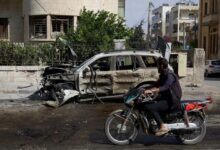Intolerable conditions in northern Gaza ‘beyond imagination’
 The UN Humanitarian Coordinator for the Occupied Palestinian Territory appealed on Tuesday for an end to the war and suffering in Gaza during his first visit to the area since Israel launched its latest military operation in the north a month ago.
The UN Humanitarian Coordinator for the Occupied Palestinian Territory appealed on Tuesday for an end to the war and suffering in Gaza during his first visit to the area since Israel launched its latest military operation in the north a month ago.
Muhannad Hadi spoke to UN News from the Al-Mamouniya School in Gaza City run by the UN agency that assists Palestine refugee, UNRWA.
Like the rest of UNRWA’s schools that are still standing as war continues, it now serves as a shelter for displaced people seeking safety in the besieged enclave where nowhere is safe.
An ‘unbearable’ situation
“This is not a place for humans to survive,” he said. “This must end. This misery must end. This war must end. This is beyond imagination.”
Mr. Hadi stated that what he saw was “very different” from what he saw in northern Gaza in September.
“At this school, I have seen families and people living on top of each other. It is unbearable here. I can’t imagine how those people are surviving,” he said.
“There were 500 people in this school in September, and now there are more than 1,500 people. There is no access to bathroom. There are shortages of food. The situation is unbearable. Sewage water is everywhere. Waste is everywhere. The place has garbage everywhere.”

UN News
Former schools continue to be used as shelters for displaced people in the northern Gaza Strip.
‘Just water and lentils’
From a window on the second floor of the damaged school, mountains of garbage can be seen piling up in the yard – a symbol of the immense health hazards and harsh conditions that the people inside face.
Critical supplies including food are scarce in northern Gaza. As Mr. Hadi walked around the school, whose structure had been damaged by the bombing, he met a man who was preparing lentil soup for his family.
Mr. Hadi was told that the lentils had been provided by UNRWA and that the small pot the man carried was supposed to feed 12 people.
“It’s just water and lentils; no garlic or onions,” he remarked, noting that “one chili pepper pod costs 10 shekels today.”
‘We want to have fun’
The senior UN official also visited a temporary learning space called Al-Nayzak on Al-Jalaa Street. Tents have been set up on the destroyed thoroughfare to provide a minimum education and a safe place for local children to deal with the horrors they have endured since the war erupted last October.
At the temporary school, 11 teachers – men and women – provide courses in Arabic, English, maths, science and psychosocial support to 510 students.
Tweet URL
Mr. Hadi played with young children, aged between three and five years old. Many were supposed to be in kindergarten, but the war has deprived them of the opportunity to learn in real classrooms.
He met a girl who said she lost her parents and home in the war, and now lives with her cousins who have also become orphans. Her school used to be located near the Al-Nayzak learning space, but like most schools in Gaza it was destroyed by shelling.
The girl told him that they cook rice at home when given the opportunity, but often rely on humanitarian organizations to provide them with meals. When Mr. Hadi asked her what she wanted to do when the war ended, she replied, “We want to have fun and enjoy ourselves, and go where we want to go.”
The top UN humanitarian official also visited the headquarters of the Atfaluna Association for Deaf Children, where students taught him sign language.
The association provides lessons in English, Arabic, maths, science, physical education and the arts to 35 children, some of whom are learning how to deal with their new disability after losing their hearing due to heavy shelling.

UN News
Muhannad Hadi (right), United Nations Humanitarian Coordinator for the Occupied Palestinian Territory visits the northern Gaza Strip.
Stop the war
Mr. Hadi told UN News that he had heard horrific stories from people he met in northern Gaza and stressed the need to stop the war.
“What people are going through here, no one can tolerate. Those are the victims of this war. Those are the ones who are paying the price for this war – those children around me here, the women, elderly,” he said.
The heads of 15 UN and international humanitarian organizations recently affirmed that “the entire Palestinian population in North Gaza is at imminent risk of dying from disease, famine and violence.”
The officials said humanitarian workers were not safe to do their work, and that Israeli forces and insecurity prevented them from reaching those in need.
Since the war began in October 2023, more than 43,000 Palestinians have been killed and 100,000 injured, according to Gaza’s Ministry of Health.
The UN estimates that more than 1.9 million people have been forcibly displaced from their homes within the enclave, many of whom have fled from one unsafe place to another multiple times.



